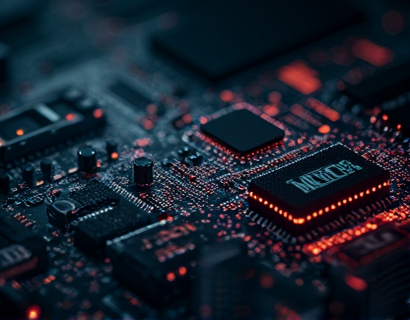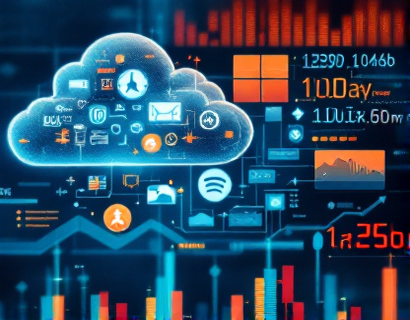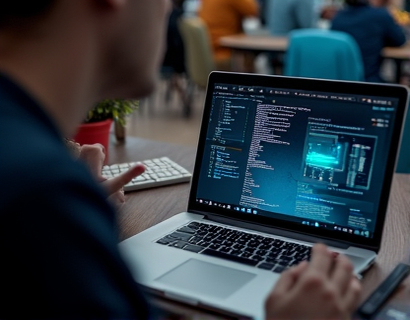Decentralized Productivity Unleashed: Harnessing AI and Crypto for Next-Gen App Ecosystems
The landscape of digital productivity is undergoing a profound transformation, driven by the convergence of artificial intelligence and blockchain technologies. This shift is giving rise to decentralized app ecosystems that promise to redefine how we work, collaborate, and manage our digital lives. In this article, we will delve into the transformative power of these decentralized technologies and explore their impact on modern workflows. We will examine how AI and crypto are merging to create innovative solutions that enhance productivity, security, and user experience.
The traditional centralized model of app development and deployment has several limitations. Centralized systems are often bottlenecked by single points of failure, vulnerable to cyber attacks, and subject to censorship and control by central authorities. These issues have spurred the development of decentralized alternatives that leverage blockchain's inherent properties of transparency, immutability, and decentralization. By distributing control across a network of nodes, decentralized systems offer a more resilient and secure environment for app ecosystems.
Artificial intelligence plays a crucial role in this new paradigm. AI algorithms can analyze vast amounts of data to optimize app performance, predict user behavior, and automate complex tasks. When combined with blockchain, AI can enhance the efficiency and reliability of decentralized applications. For instance, AI-driven smart contracts can execute transactions based on predefined conditions, reducing the need for intermediaries and lowering transaction costs.
One of the key benefits of decentralized app ecosystems is enhanced security. Blockchain technology ensures that data is stored across multiple nodes, making it extremely difficult for hackers to alter or steal information. This decentralized storage mechanism, coupled with cryptographic techniques, provides a robust defense against cyber threats. Moreover, the transparency of blockchain allows users to verify transactions and app operations, fostering trust and accountability.
Decentralized applications, or dApps, are the building blocks of these new app ecosystems. Unlike traditional apps that rely on central servers, dApps run on a blockchain network, ensuring that no single entity has control over the application. This decentralization not only enhances security but also promotes openness and collaboration. Developers can build on existing blockchain platforms, creating a modular and interoperable ecosystem where apps can seamlessly integrate and communicate with each other.
The integration of AI in dApps brings additional value by enabling intelligent and adaptive functionalities. For example, AI-powered chatbots can provide personalized assistance to users, while machine learning algorithms can optimize resource allocation and improve decision-making processes. These intelligent features enhance the user experience, making decentralized apps more intuitive and efficient.
Another significant advantage of decentralized app ecosystems is their scalability. Traditional centralized systems often struggle to scale due to the limitations of central servers. In contrast, blockchain-based ecosystems can handle a growing number of users and transactions without compromising performance. The distributed nature of these systems allows for horizontal scaling, where additional nodes can be added to the network to accommodate increased demand.
Interoperability is another critical aspect of decentralized app ecosystems. As more blockchain platforms and dApps emerge, the need for seamless interaction between different systems becomes paramount. Cross-chain technologies and protocols are being developed to enable communication and data exchange between disparate blockchain networks. This interoperability ensures that users can access a wide range of apps and services without being confined to a single ecosystem, fostering a more connected and dynamic digital environment.
The role of cryptocurrency in this ecosystem cannot be overstated. Cryptocurrencies serve as the native tokens for decentralized apps, facilitating transactions and incentivizing participation. These digital currencies provide a decentralized alternative to traditional payment systems, reducing reliance on centralized financial institutions. Smart contracts can automate the distribution of tokens based on specific criteria, ensuring fair and transparent reward mechanisms for contributors and users.
Beyond transactions, cryptocurrencies play a crucial role in governance and community management within decentralized app ecosystems. Token holders can participate in decision-making processes through decentralized autonomous organizations (DAOs). These DAOs allow community members to propose, vote on, and implement changes to the app ecosystem, ensuring that the development aligns with the collective interests of the users.
The potential applications of decentralized app ecosystems are vast and varied. In the realm of productivity, decentralized tools can streamline workflows, enhance collaboration, and improve data management. For instance, decentralized project management platforms can provide transparent task tracking, secure file sharing, and automated workflow orchestration. AI-driven analytics can offer insights into team performance and suggest optimizations, all while ensuring data privacy and security.
In the context of content creation and distribution, decentralized platforms can empower creators by giving them direct control over their work and revenue streams. Blockchain-based content marketplaces can ensure fair compensation for creators, eliminate intermediaries, and provide transparent tracking of content usage. AI can further enhance these platforms by curating content, personalizing user experiences, and identifying emerging trends.
Healthcare is another sector that stands to benefit significantly from decentralized app ecosystems. Decentralized health records can provide patients with full control over their medical data, ensuring privacy and security. AI-powered diagnostic tools can analyze medical data from multiple sources, offering more accurate and timely diagnoses. Smart contracts can automate insurance claims and drug prescriptions, streamlining the healthcare process and reducing administrative burdens.
Education is yet another area where decentralized technologies can revolutionize traditional models. Decentralized learning platforms can offer secure and verifiable credentials, enabling learners to showcase their achievements to employers and educational institutions. AI-driven personalized learning paths can adapt to individual student needs, providing tailored educational experiences. Blockchain can ensure the integrity and ownership of educational content, preventing piracy and unauthorized distribution.
To fully harness the potential of decentralized app ecosystems, it is essential to address several challenges. Scalability remains a key issue, as blockchain networks need to handle increasing transaction volumes without compromising speed and reliability. Research into layer 2 solutions, such as sidechains and state channels, is ongoing to address these scalability concerns. Additionally, user adoption depends on creating intuitive and user-friendly interfaces that bridge the gap between technical complexity and everyday usability.
Regulatory frameworks also play a crucial role in the development of decentralized app ecosystems. Clear and supportive regulations can foster innovation while protecting users and maintaining market integrity. Collaboration between technologists, policymakers, and industry stakeholders is essential to create an environment that encourages responsible and sustainable growth.
In conclusion, the convergence of AI and blockchain is paving the way for a new era of decentralized app ecosystems. These ecosystems offer enhanced security, scalability, and user empowerment, transforming the way we interact with digital tools and services. As the technology matures and more applications emerge, the potential to revolutionize various industries and aspects of daily life becomes increasingly evident. Embracing this decentralized future is not just an option but a necessity for those who wish to stay ahead in the digital landscape.










































